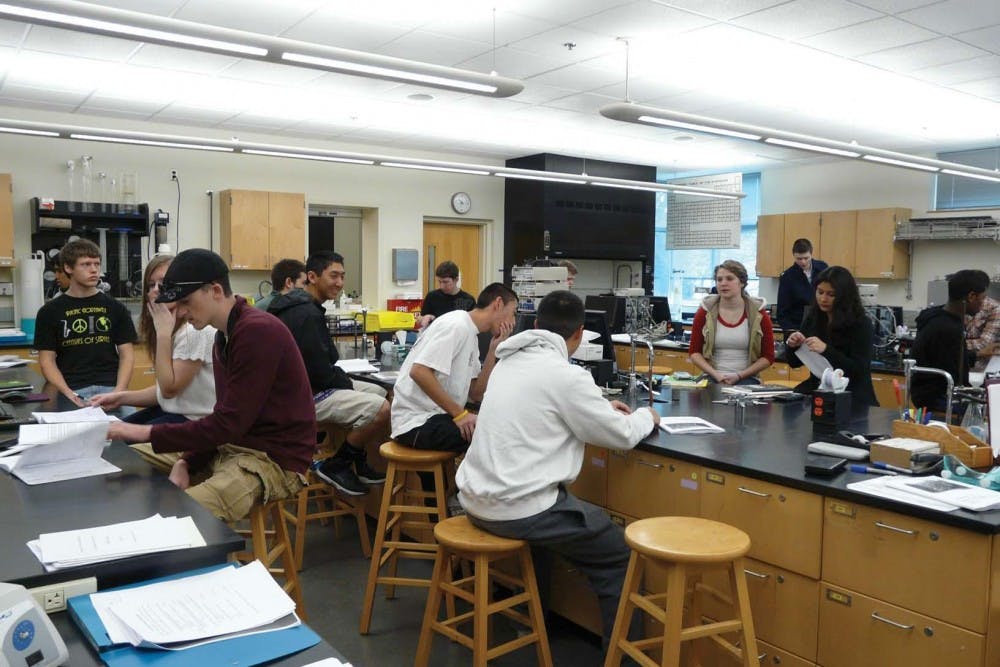(Alissa White -- The Beacon)
By Will Lyons & Natalie Wheeler, Staff Writer -- lyons14@up.edu -- wheelern12@up.edu
In response to a resolution passed by ASUP on Nov. 18, the Chemistry Department has initiated steps to maximize lab space and alleviate what some students deem overcrowding.
The resolution proposed hiring more chemistry faculty, expanding chemistry facilities and establishing smaller class size limits for both lecture and laboratory courses.
Sophomore and ASUP Senator Kyle Hamm, the resolution's sponsor, understands it is unlikely all the recommendations will happen.
"I'll be honest, I know that adding more space is a lofty goal," Hamm said, "but we just want to say that, when they're addressing the issue, at least throw that into the ring."
With no new additional lab space in the near future, the Chemistry Department has decided to maximize the available space to adjust for the growing number of students who need to take chemistry classes.
"Next semester we're going to add sections of chem labs on Tuesday, Thursday and Friday to accommodate more students," Steven Mayer, Chemistry Department chair, said. "For a school our size we've got the right size of chemistry students. We're at a good equilibrium."
Even with additional lab sections students don't see the problem as completely worked out.
"It seems like a good solution in the short term, but I don't see how it solves the issue in the long run," Hamm said of the increased sections.
Senior and ASUP president Colin Dorwart has presented the resolution to UP President Fr. William Beauchamp, C.S.C., the Board of Regents and UP's provost Br. Donald Stabrowski, C.S.C.
"The issue isn't really overcrowding as much as a scheduling problem," Strabrowski said. "There are only so many hours in a day, and students select certain times over others."
In fact, Self Serve on Moodle shows open slots still remaining on Friday afternoon for General Chemistry lab, and 8:10 a.m. for Organic Chemistry lab.
However, the popular time slots are over-enrolled by as many as six students.
With scheduling problems apparently solved for the immediate future, the Chemistry Department will eventually have to deal with the issue of lab space if the department continues to grow at the rate it has over the past few years.
When Mayer joined the University of Portland in 2002, there were just 35 chemistry majors. Now, there are over 100. Other majors requiring chemistry courses have grown as well, such as biology, environmental science and engineering.
Dorwart thinks the issue is a symptom of the increase in overall student population. He hopes the administration realizes its need to expand as the student body grows.
"I think it's a question of enrollment management," Dorwart said. "If we want to increase our enrollment, we have to accommodate."
Freshman Walker Ross, a biology major, didn't think he would have to struggle to get into his classes at a small liberal arts school like UP.
He had to get signatures on closed course forms for all of the classes inside his major, including general chemistry.
"For a class that I need to take now in order to graduate on time, I had to claw and fight my way through to get the classes I needed," Ross said.
Ross also voiced concern over the growing class sizes for labs.
"Labs are not exactly one-on-one but you're supposed to know your instructor better than lecture," Ross said. "I've been delayed and had to go overtime in lab because there just wasn't enough equipment."
However Mayer says the labs are still under capacity with a class cap at 24 students.
"I think that students get used to classes with 16 or 18 people," Mayer said, "but we are well behind fire code with 24 people."
Mayer also says the Chemistry Department still wishes to lower class sizes for labs, add tenured faculty and continue to work with the administration to realize these goals.
As enrollment increases, Hamm hopes the resolution will make the administration aware that UP cannot continue to grow without also expanding its resources.
"We're a small enough school to where this shouldn't have to happen," Hamm said. "It's not just the Chemistry Department. The university as a whole is busting at the seams."








